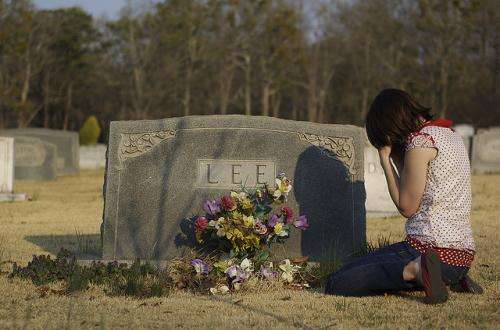Specialist intervention needed in grief support model

A new public health model for supporting mourning is one step closer to being implemented, according to Curtin and La Trobe University researchers.
The model will identify if a grieving person needs intervention and assess the level of care required, improving on the current 'blanket' approach to bereavement support.
"In practice, the majority of bereaved people manage their grief with the support of family, friends and neighbours," Curtin University Professor Samar Aoun says.
"Others may benefit from participating in a support group or talking with someone who has expert knowledge about the various ways grief can be expressed.
"But a small proportion, about 10 to 20 per cent, experience persistent psychiatric difficulties, including Prolonged Grief Disorder, previously known as complicated or traumatic grief.
"This group exhibits higher levels of distress and is most likely to benefit from targeted psychological interventions, whereas such interventions may be of marginal benefit, or even counter-productive, for others."
To assess the need and level of care required, researchers created a questionnaire designed to place individuals into low, medium or high levels of risk.
This determination is based on factors such as the presence of separation distress, its duration, cognitive, emotional and behavioural symptoms and social and/or occupational impairment.
Mourners split into three groups
This in turn helps health professionals ensure support offered meets individual needs.
"For instance, the majority [low risk] require information and compassion, a smaller group [medium risk] would benefit from peer support and community-based groups, and an even smaller group [high risk] would be directed to specialist intervention," Prof Aoun says.
Researchers found that those with a high risk of developing bereavement issues were often dealing with the unexpected deaths of a spouse or child.
Those in the middle-risk group tended to be older people caring for dying spouses after a reasonable period of care, while the low-risk group were generally middle-aged people who had cared for a dying parent.
This highlights how the length of an illness, as well as perceived support, affects bereavement.
"Given these findings, we question the approach of some palliative care services in Australia and overseas that attempt to provide blanket or undifferentiated support to all bereaved clients," Prof Aoun says.
"This is neither an effective nor economic use of their limited resources and can contribute to health professionals' stress and burnout."
More information: "Reported experiences of bereavement support in Western Australia: a pilot study." Australian and New Zealand Journal of Public Health. DOI: 10.1111/1753-6405.12177














